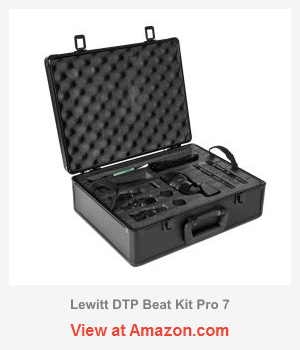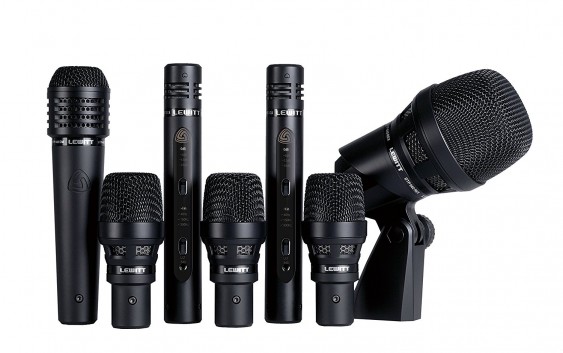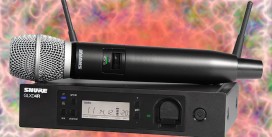Lewitt DTP Beat Kit Pro 7 is a stunning quality premium set of drum mics that beats pretty much anything in the $1,000 range. The value for money is simply amazing, because this kit includes two externally polarized LCT 340 as overheads, for which alone it is actually worth buying! Toms, snare and kick mics are excellent too – for dynamics, they offer a breathtaking amount of detail and clarity without compromising their low-end response. This reference kit is more than enough for a quality studio production and any live performance. Not to mention, the mics are highly durable and they look kick ass too.
What do we have here?
DTP Beat Kit Pro 7 comes in a sturdy black road case with an eccentric label that reads – “Sounds like Lewitt”. In the top compartment you will find one DTP 640 REX, a unique dual element kick drum, and a special splitter cable to access each of them separately. Then there lie four dynamic mics, three supercardioid DTP 340 TT and one cardioid MTP 440 DM. Those mics are meant for the tom toms and the snare respectively. For overheads, there is a pair of LCT 340 with cardioid capsules and foam windshields. The omnidirectional capsules are not included in this particular kit.
On the second level of the case, you will find the following mounting accessories. Five DTP 40 MTS rubber shock mounts, three for the toms and two for the overheads. For the snare mic there is a different MTP 40 MCS, handheld-style shock mount, and the kick mic doesn’t need any. Finally, the kit includes four DTP 40 MT rim mounts for the toms and the snare. Therefore, all you need is a decent drum set, two overhead stands, a kick drum stand and you are set. The quality of the accessories is great; they hold well and don’t loosen. In case you need a replacement, they are cheap as well!
DTP 640 REX review
This drum mic combines two phase-matched cardioid capsules in one housing. First capsule is dynamic and the second one is electret condenser. Although both of them offer a full spectrum linear frequency response, the condenser element excels at producing a rich, quality low end while the dynamic element makes for a more expressive drum attack. Moreover, Lewitt DTP 640 REX has three EQ settings and two pad attenuators, so it’s a very versatile mic. It can be used for something like double bass or bass cabinets but first of all it is a kick drum mic, so let’s talk more about its performance in that vein.
The rich low end response of this mic actually lives up to the hype. Its condenser component goes as low as 20 Hz and remains incredibly clean yet powerful… enough to shake the walls! Of course, you will need some decent acoustics, huge hifi monitors and a good power amplifier in order to appreciate its full potential, but even without all this, it’s just hard not to notice how much better it is at reproducing the low-end component of any given kick drum, compared to dynamic mics. And what’s especially great is the absence of color and resonances, so on that part, it will work equally well for drums of any size.
But what about the attack of the DTP 640 REX? Well, the dynamic capsule has a neutral response. It’s not as bright and hyped as most other mics, yet still gives you lots of detail and clarity. It sounds very much natural and realistic, however if you have a shitty drum, it may also sound shitty. If you are after a scooped mid-range sound of Audix D6 and similar mics, you can set the EQ switch in the third position and it will do just that. In the second position, it will only boost the attack and sound similar to Beta 52A. I personally didn’t find myself using those filters but the flat mode gave me the ideal sound I was after.
DTP 340 TT for toms
 Lewitt DTP 340 TT’s are dynamic tom tom mics with a supercardioid pattern. This pattern helps to eliminate the bleed while increasing their feedback resistance. At the same time, the mic takes advantage of the proximity effect for achieving a deeper and more substantial sound. What’s important is that they sound fat without being particularly annoying. They produce a punchy attack and sound very crispy on the high end as well. There is a decent amount of brightness while the mids are gently scooped out. This makes them very effective in the mix for tom toms and percussion instruments in general.
Lewitt DTP 340 TT’s are dynamic tom tom mics with a supercardioid pattern. This pattern helps to eliminate the bleed while increasing their feedback resistance. At the same time, the mic takes advantage of the proximity effect for achieving a deeper and more substantial sound. What’s important is that they sound fat without being particularly annoying. They produce a punchy attack and sound very crispy on the high end as well. There is a decent amount of brightness while the mids are gently scooped out. This makes them very effective in the mix for tom toms and percussion instruments in general.
MTP 440 DM for snare
MTP 440 DM may be an inexpensive mic, but comparing it to a Shure SM57 is like comparing a Cheops Pyramid to a pile of dung, or sort of. The Lewitt’s mic is less resonant, smoother and more resistant to feedback, and produces a higher output as well. The midrange is far more stable and so is the low end, which also extends a bit lower. You may not necessarily need all this for getting a decent snare sound but try comparing vocals and you will be amazed by the difference! Finally, MTP 440 DM is far crispier than the SM57. Not as bright though, but the overheads would usually brighten it up a bit.
LCT 340 for overheads
Lewitt LCT 340 are probably ones of the best overhead mics in the industry. Among others, they beat the legendary Shure SM81 and Sennheiser e914, not to mention the cheaper mics. But do not be surprised! They are actually quite expensive and sell $499 a piece. And this drum kit includes a matched pair, which is just unbelievable considering the price. So yeah, as I said, it is actually worth buying this kit for those overheads alone. The only caveat is that they don’t include the omni capsules, but you can live with that, don’t you? Anyway, for drum overheads it is much easier to use cardioids than omni.
So what’s the big deal about LCT 340, and how are they different? Unlike most other instrument mics, they are externally polarized. This gives them an advantage over the more common electret condensers as being a bit more flexible. Those mics have a decent sensitivity, relatively low self-noise and high SNR and wide dynamic range. The frequency pattern is also notably flat, which is important for the overheads because you don’t want to color the cymbals. There is only a touch of added brightness but the higher end is very smooth and it captures all the details and subtleties without adding any harshness.
Not only are the mics incredibility crisp, they also boast having a very accurate low end and mid-range. And if you don’t need the low end, there are three switchable low cut filters at your disposal. The pad attenuators are very flexible too; you can adjust for 6 dB, 12 dB and 18 dB depending on how close they are to the source and how loud is it. Aside from the overheads, those mics will excel with stringed instruments, pianos, different percussions and what not. So if you happened to be the lucky owner of the Lewitt LCT 340’s, be prepared when your fellow musicians ask you to borrow them for a while…
Conclusion
Is it really worth buying the Lewitt DTP Beat Kit Pro 7? Nope, just buy the above mics individually and forget about Amazon, so you will pay the full retail price as well. Let’s see now just for the lulz, how much that would cost you. DTP 640 REX – $399, DTP 340 TT – $105 x 3, LCT 340 – $629 x 2, MTP 440 DM – $119. Total of only $2,091 (excluding the accessories). So yeah, don’t you ever buy this kit! I’m just kidding… For the price they are selling it, I think it’s a no-brainer. Last year we have reviewed the Audix DP7 in a similar price range and it was great, but the DTP Beat Kit Pro 7 obviously beats it hands down.
Pros
|
Cons
|









